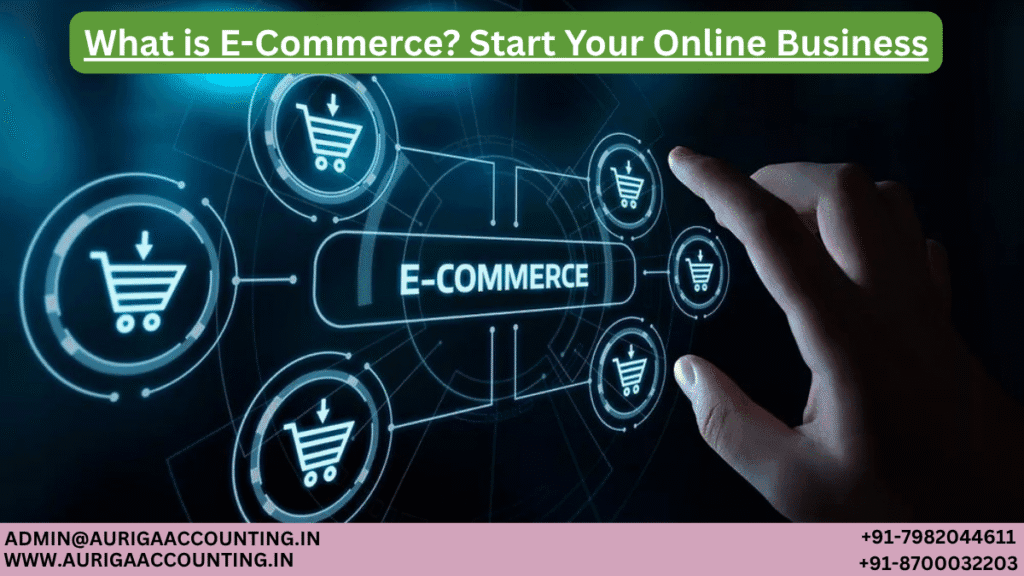Rohit is a seasoned legal writer known for simplifying complex legal concepts into practical, easy-to-understand guidance. His work empowers entrepreneurs with the legal insights needed to launch, run, and grow their businesses with confidence.

What is E-Commerce? Start Your Online Business
Introduction
ToggleE-commerce, or selling products online, is booming in India—offering businesses of all sizes a powerful way to reach more customers. Whether you’re a small shop owner or run a large enterprise, taking your business online can open new growth opportunities. At Auriga Accounting pvt. ltd. , we’re here to support you through every step of the process. In this guide, we’ll explain what e-commerce is, why it matters, and how you can launch your own online store with ease.
What is E-Commerce?
E-commerce refers to the buying and selling of goods or services over the Internet. It has become increasingly popular thanks to its ease of use and widespread accessibility. Instead of operating through a traditional brick-and-mortar store, e-commerce businesses run digital storefronts where customers can browse, select, and purchase products online.
Key Benefits of E-Commerce:
Convenience: Shoppers can make purchases anytime, from anywhere, without visiting a physical store.
Wider Reach: With just an internet connection, businesses can sell to customers across the globe.
Greater Variety: Online platforms often offer more products and services than conventional retail outlets.
Cost Savings: Without the need for physical retail space, businesses can reduce overhead expenses and offer better prices to customers.
What is an E-Commerce Business?
An e-commerce business involves selling products or services through an online platform, offering customers a smooth and convenient shopping experience. Whether you’re starting from scratch or transitioning a physical store to the digital space, the goal is to create a virtual storefront that attracts and serves your audience effectively.
How to Start an E-Commerce Business
To launch a successful e-commerce venture, focus on building a strong digital foundation. Key elements include:
User-Friendly Website: Design a site that’s easy to navigate, visually appealing, and optimized for both desktop and mobile users.
Secure Payment Gateway: Ensure safe and hassle-free transactions by integrating trusted and encrypted payment systems.
Clear Product Listings: Include detailed descriptions, high-quality images, and transparent pricing to help customers make informed choices.
Alternatively, entrepreneurs can choose to sell on established marketplaces like Amazon, Flipkart, or eBay. These platforms offer built-in customer bases, logistical support, and essential selling tools, making it easier to start and grow your online business.
Example of Setting Up an E-Commerce Business
Consider the example of Ritika, who wants to sell handmade sweaters online:
Building an Online Store: Ritika begins by developing a website to showcase her collection. Each product includes clear descriptions with details like size, color, material, and pricing to help customers make informed decisions.
Implementing Digital Marketing: After her site is live, Ritika uses digital marketing strategies such as Search Engine Optimization (SEO), social media promotions, and email campaigns to attract visitors and boost online visibility.
Running Operations from Home: Ritika manages inventory, processes orders, and handles customer queries—all from the comfort of her home, without the need for a physical shop.
Benefits of E-Commerce for Entrepreneurs
E-commerce is reshaping how entrepreneurs launch and scale businesses. Here are its key advantages:
Global Reach: Online platforms eliminate geographic limitations, allowing sellers to access customers worldwide—especially valuable for niche or specialty products.
Lower Operational Costs: E-commerce reduces or eliminates expenses like rent, in-store staffing, and utility bills, making it easier to manage finances and reinvest profits.
Round-the-Clock Sales: Unlike traditional stores, e-commerce platforms remain open 24/7, offering convenience to customers and generating revenue outside of regular business hours.
Scalable Growth: Expanding an online business is easier and less capital-intensive than growing a physical store. Entrepreneurs can introduce new products or target new regions with minimal effort.
Data-Driven Marketing: Online platforms provide insights into customer behavior, enabling personalized promotions and more effective advertising campaigns.
Valuable Analytics: Tools integrated into e-commerce systems offer detailed analytics on sales, traffic, and customer preferences—critical for strategic decision-making.
Quick Launch: Starting an e-commerce business requires fewer resources and can be done faster compared to opening a brick-and-mortar store.
Eco-Friendly Approach: E-commerce operations can reduce environmental impact by minimizing physical infrastructure and optimizing delivery systems.
E-Commerce vs. Traditional Business Models
While conventional retail stores still hold value, e-commerce offers distinct advantages that align with modern consumer preferences:
| Aspect | Traditional Business | E-Commerce Business |
|---|---|---|
| Physical Presence | Requires a storefront or shop location | Fully digital—no physical premises needed |
| Operating Hours | Limited to fixed business hours | Accessible 24/7 |
| Market Reach | Restricted to local or regional markets | Global accessibility |
| Startup Costs | High setup costs (rent, staff, inventory space) | Lower costs (website, hosting, digital tools) |
| Customer Engagement | Face-to-face interaction | Online interaction via chat, email, or social media |
| Inventory Management | Often manual and time-consuming | Streamlined with automated inventory tools |
Can I Start an E-Commerce Business Right Now?
Absolutely! Starting an e-commerce business today is more accessible than ever. Whether you choose to build your own website or sell through an established online marketplace, there are numerous platforms and tools available to help you get started quickly. That said, aspiring entrepreneurs should consider two key aspects before diving in:
Who Can Start an Online Business?
One of the most appealing aspects of e-commerce is its inclusivity. There are no specific educational qualifications, prior business experience, or large capital investments required. Anyone with a product or service to offer can begin selling online and earn an income.
Although minors (under 18) cannot legally register a business independently, they can still explore entrepreneurship under the guidance of a parent or guardian. This makes e-commerce a viable opportunity for people of all ages and backgrounds.
What Do You Need to Start?
Unlike traditional businesses that involve high startup costs—such as renting physical space, securing long-term leases, or paying for utilities—starting an e-commerce business is much simpler.
All you really need is:
A smartphone or computer
A stable internet connection
Products or services to sell
That’s it—minimal resources, maximum potential.
How to Start an E-Commerce Business on an Online Marketplace
The online marketplace is dynamic and constantly evolving, but a few fundamental steps will help you establish a solid foundation for your e-commerce venture:
Step 1: Define Your Business Idea
Choose a product or service you’re passionate about and have some knowledge of. A strong understanding of your niche helps in building trust and credibility with customers.
Step 2: Select a Marketplace
Decide whether you want to build your own website or join a well-established marketplace like Amazon, Flipkart, or Meesho. Marketplaces offer built-in customer bases, seller tools, and logistics support—making it easier to get started.
Step 3: Register as a Seller
Sign up on the chosen marketplace by providing the required details such as your name, contact information, bank account, and GSTIN (if applicable). Most platforms have a guided registration process.
Step 4: List Your Products
Create organized product listings by categorizing your items and including clear titles, descriptions, prices, and high-quality images. Transparent and informative listings help build buyer confidence.
Step 5: Set Competitive Prices
Analyze the market and set your product prices strategically. Tools like Amazon’s Automate Pricing Tool can help you stay competitive by adjusting your prices based on rules you define.
Step 6: Plan Your Marketing Strategy
To attract and retain customers, it’s essential to have a well-thought-out marketing plan. Utilize social media, email marketing, and paid ads to drive traffic to your store. A strong launch and post-launch strategy will help build momentum.
Step 7: Launch Your Store
With your listings live and strategy in place, launch your store. Be ready to process orders efficiently, manage inventory, and provide excellent customer service to build a positive brand reputation
About the Author
Rohit
February 21, 2026
new
January 10, 2026
January 8, 2026
January 8, 2026
January 2, 2026
December 29, 2025
December 29, 2025
December 26, 2025
November 28, 2025
November 28, 2025
November 25, 2025
November 24, 2025
November 21, 2025
November 21, 2025
November 12, 2025
November 12, 2025
November 12, 2025
July 23, 2025
July 22, 2025
July 22, 2025
July 21, 2025
July 21, 2025
July 21, 2025
July 19, 2025
July 18, 2025
July 18, 2025
July 18, 2025
July 18, 2025
July 17, 2025
July 16, 2025
July 15, 2025
June 18, 2025
June 17, 2025
June 17, 2025
June 17, 2025
June 17, 2025
June 16, 2025
Limited Liability Partnership (LLP): Definition, Full Form, Benefits, Drawbacks & Registration Guide
June 16, 2025
June 16, 2025
June 14, 2025
June 14, 2025
June 14, 2025
June 14, 2025
June 13, 2025
June 11, 2025
June 11, 2025
June 11, 2025
June 11, 2025
June 11, 2025
June 10, 2025
June 10, 2025
June 9, 2025
June 5, 2025
June 4, 2025
June 3, 2025
June 3, 2025
June 3, 2025
June 3, 2025
May 31, 2025
May 31, 2025
May 30, 2025
February 9, 2024
February 8, 2024
February 7, 2024
February 6, 2024
February 3, 2024
February 1, 2024
January 25, 2024
January 24, 2024
January 24, 2024
January 23, 2024
January 19, 2024
January 17, 2024
January 13, 2024
January 10, 2024
January 4, 2024
December 30, 2023
December 30, 2023
November 6, 2023
November 6, 2023
November 6, 2023
November 6, 2023
November 6, 2023
November 6, 2023
November 4, 2023
November 4, 2023
November 4, 2023
November 4, 2023
November 4, 2023
November 4, 2023
November 2, 2023
November 2, 2023
November 2, 2023
November 2, 2023
November 1, 2023
November 1, 2023
November 1, 2023
November 1, 2023
November 1, 2023
November 1, 2023
November 1, 2023
November 1, 2023
November 1, 2023
November 1, 2023
November 1, 2023
November 1, 2023
November 1, 2023
November 1, 2023
October 31, 2023
October 31, 2023
October 31, 2023
October 31, 2023
October 31, 2023
October 31, 2023
October 31, 2023
October 31, 2023
October 31, 2023
October 31, 2023
October 31, 2023
October 31, 2023
October 30, 2023
October 30, 2023
October 30, 2023
October 30, 2023
October 30, 2023
October 30, 2023
October 30, 2023
October 30, 2023
October 30, 2023
October 30, 2023
October 30, 2023
October 30, 2023
October 30, 2023
October 30, 2023
October 30, 2023
October 30, 2023
October 30, 2023
October 30, 2023
October 25, 2023
October 25, 2023
October 25, 2023
October 25, 2023
October 25, 2023
October 25, 2023
October 25, 2023
October 21, 2023
October 21, 2023
October 21, 2023
October 21, 2023
October 21, 2023
October 21, 2023
October 20, 2023
October 20, 2023
October 20, 2023
October 20, 2023
October 20, 2023
October 20, 2023
October 20, 2023
October 20, 2023
October 19, 2023
October 19, 2023
October 19, 2023
October 19, 2023
October 18, 2023
October 18, 2023
October 18, 2023
October 17, 2023
October 17, 2023
October 17, 2023
October 17, 2023
October 17, 2023
October 17, 2023
October 17, 2023
October 16, 2023
October 16, 2023
October 16, 2023
October 16, 2023
October 16, 2023
October 16, 2023
October 16, 2023
October 16, 2023
October 14, 2023
October 14, 2023
October 14, 2023
October 14, 2023
October 14, 2023
October 14, 2023
October 12, 2023
October 12, 2023
October 12, 2023
October 12, 2023
October 12, 2023
October 12, 2023
October 11, 2023
October 11, 2023
October 11, 2023
October 11, 2023
October 11, 2023
October 11, 2023
October 10, 2023
October 10, 2023
October 10, 2023
October 10, 2023
October 10, 2023
October 10, 2023
October 10, 2023
October 10, 2023
October 7, 2023
October 7, 2023
October 7, 2023
October 7, 2023
October 7, 2023
October 7, 2023
October 6, 2023
October 6, 2023
October 6, 2023
October 6, 2023
October 6, 2023
October 5, 2023
October 5, 2023
October 4, 2023
October 4, 2023
September 13, 2023
August 19, 2023
August 18, 2023
August 16, 2023
August 14, 2023
August 14, 2023
August 14, 2023
August 14, 2023
August 14, 2023
August 14, 2023
August 14, 2023
August 12, 2023
August 12, 2023
August 12, 2023
August 12, 2023
August 12, 2023
August 12, 2023
August 12, 2023
August 12, 2023
August 11, 2023
August 11, 2023
August 11, 2023
August 11, 2023
August 11, 2023
August 11, 2023
August 11, 2023
August 11, 2023
August 10, 2023
August 10, 2023
August 10, 2023
August 10, 2023
August 7, 2023
August 7, 2023
August 7, 2023
August 4, 2023
August 4, 2023
August 4, 2023
August 3, 2023
August 3, 2023
August 2, 2023
August 2, 2023
August 2, 2023
July 22, 2023
July 22, 2023
July 19, 2023
July 19, 2023
July 17, 2023
July 17, 2023
July 17, 2023
July 14, 2023
July 13, 2023
July 13, 2023
July 13, 2023
July 11, 2023
July 11, 2023
July 10, 2023
July 10, 2023
July 10, 2023
July 8, 2023
July 8, 2023
July 7, 2023
July 7, 2023
July 7, 2023
July 7, 2023
July 6, 2023
July 6, 2023
July 6, 2023
July 6, 2023
July 6, 2023
July 5, 2023
July 5, 2023
July 5, 2023
July 4, 2023
July 4, 2023
July 4, 2023
July 4, 2023
July 4, 2023
June 28, 2023
June 28, 2023
June 28, 2023
June 28, 2023
June 28, 2023
June 28, 2023
June 27, 2023
June 27, 2023
June 26, 2023
June 24, 2023
June 22, 2023
RELATED ARTICLES
Registering...
Steps to Start...
Startup in...
Ideas for...
LLP Form No....
No posts found












